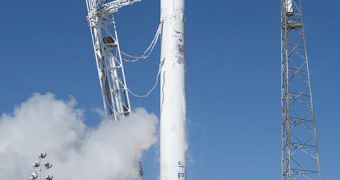Officials from the Hawthorne, California-based Space Exploration Technologies Corporation (SpaceX) announce that they have decided to delay the launch of the Falcon 9 medium-lift delivery system and the unmanned Dragon space capsule, originally scheduled for February 7.
The combo was to be the first privately-built spacecraft to make its way to the International Space Station (ISS), and attempt to dock on the orbital outpost. SpaceX is not canceling the flight, but rather delaying it so that the company has more time to prepare the Falcon 9.
Both spacecraft were developed by the corporation with NASA support. The rocket took its maiden flight back in June 2010, and carried the first Dragon to low-Earth orbit six months later. Both flights were successful, and also a prerequisite in the contracts the company has with the space agency.
The same contracts called for two additional test flights, one meant to further assess the behavior of the Dragon space capsule in orbit, and the other one to attempt to dock to the orbital lab. SpaceX managed to get the necessary approvals to merge the two flights together, despite Russian opposition.
The company set February 7 as its tentative launch date, but representatives announced yesterday, January 16, that the rocket will take off at a later date, without specifying exactly when this might happen. NASA is currently being consulted for establishing an appropriate launch schedule.
Falcon 9 rockets can only take off from the Cape Canaveral Air Force Station (CCAFS) Space Launch Complex 40 (SLC-40), in Florida, or SLC-4E, at the Vandenberg Air Force Base (VAFB), in California.
“In preparation for the upcoming launch, SpaceX continues to conduct extensive testing and analysis. We believe that there are a few areas that will benefit from additional work and will optimize the safety and success of this mission,” Space quotes SpaceX spokesperson Kirstin Grantham as saying.
“We are now working with NASA to establish a new target launch date, but note that we will continue to test and review data. We will launch when the vehicle is ready,” the representative went on to say.
At this point, the pressure on SpaceX is tremendous. If it succeeds, then it will have proven that the private spaceflight industry is indeed something worth investing in. If something goes wrong, or the $100 billion ISS is damaged or threatened in any way, then funding could stop for all other companies.
Under these circumstances, it's easy to see why engineers are taking such precautions in checking and double-checking everything.

 14 DAY TRIAL //
14 DAY TRIAL //